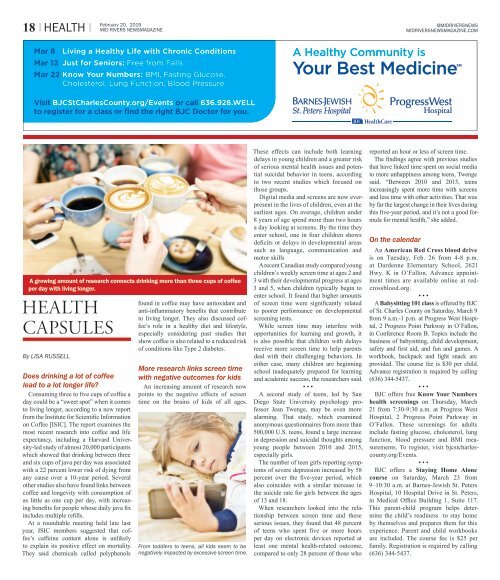Mid Rivers Newsmagazine 2-20-19
Local news, local politics and community events for St. Charles County Missouri.
Local news, local politics and community events for St. Charles County Missouri.
Create successful ePaper yourself
Turn your PDF publications into a flip-book with our unique Google optimized e-Paper software.
18 I HEALTH I<br />
February <strong>20</strong>, <strong>20</strong><strong>19</strong><br />
MID RIVERS NEWSMAGAZINE<br />
@MIDRIVERSNEWS<br />
MIDRIVERSNEWSMAGAZINE.COM<br />
A growing amount of research connects drinking more than three cups of coffee<br />
per day with living longer.<br />
health<br />
capsules<br />
By LISA RUSSELL<br />
Does drinking a lot of coffee<br />
lead to a lot longer life?<br />
Consuming three to five cups of coffee a<br />
day could be a “sweet spot” when it comes<br />
to living longer, according to a new report<br />
from the Institute for Scientific Information<br />
on Coffee [ISIC]. The report examines the<br />
most recent research into coffee and life<br />
expectancy, including a Harvard University-led<br />
study of almost <strong>20</strong>,000 participants<br />
which showed that drinking between three<br />
and six cups of java per day was associated<br />
with a 22 percent lower risk of dying from<br />
any cause over a 10-year period. Several<br />
other studies also have found links between<br />
coffee and longevity with consumption of<br />
as little as one cup per day, with increasing<br />
benefits for people whose daily java fix<br />
includes multiple refills.<br />
At a roundtable meeting held late last<br />
year, ISIC members suggested that coffee’s<br />
caffeine content alone is unlikely<br />
to explain its positive effect on mortality.<br />
They said chemicals called polyphenols<br />
found in coffee may have antioxidant and<br />
anti-inflammatory benefits that contribute<br />
to living longer. They also discussed coffee’s<br />
role in a healthy diet and lifestyle,<br />
especially considering past studies that<br />
show coffee is also related to a reduced risk<br />
of conditions like Type 2 diabetes.<br />
More research links screen time<br />
with negative outcomes for kids<br />
An increasing amount of research now<br />
points to the negative effects of screen<br />
time on the brains of kids of all ages.<br />
From toddlers to teens, all kids seem to be<br />
negatively impacted by excessive screen time.<br />
These effects can include both learning<br />
delays in young children and a greater risk<br />
of serious mental health issues and potential<br />
suicidal behavior in teens, according<br />
to two recent studies which focused on<br />
those groups.<br />
Digital media and screens are now everpresent<br />
in the lives of children, even at the<br />
earliest ages. On average, children under<br />
8 years of age spend more than two hours<br />
a day looking at screens. By the time they<br />
enter school, one in four children shows<br />
deficits or delays in developmental areas<br />
such as language, communication and<br />
motor skills<br />
A recent Canadian study compared young<br />
children’s weekly screen time at ages 2 and<br />
3 with their developmental progress at ages<br />
3 and 5, when children typically begin to<br />
enter school. It found that higher amounts<br />
of screen time were significantly related<br />
to poorer performance on developmental<br />
screening tests.<br />
While screen time may interfere with<br />
opportunities for learning and growth, it<br />
is also possible that children with delays<br />
receive more screen time to help parents<br />
deal with their challenging behaviors. In<br />
either case, many children are beginning<br />
school inadequately prepared for learning<br />
and academic success, the researchers said.<br />
• • •<br />
A second study of teens, led by San<br />
Diego State University psychology professor<br />
Jean Twenge, may be even more<br />
alarming. That study, which examined<br />
anonymous questionnaires from more than<br />
500,000 U.S. teens, found a large increase<br />
in depression and suicidal thoughts among<br />
young people between <strong>20</strong>10 and <strong>20</strong>15,<br />
especially girls.<br />
The number of teen girls reporting symptoms<br />
of severe depression increased by 58<br />
percent over the five-year period, which<br />
also coincides with a similar increase in<br />
the suicide rate for girls between the ages<br />
of 13 and 18.<br />
When researchers looked into the relationship<br />
between screen time and these<br />
serious issues, they found that 48 percent<br />
of teens who spent five or more hours<br />
per day on electronic devices reported at<br />
least one mental health-related outcome,<br />
compared to only 28 percent of those who<br />
reported an hour or less of screen time.<br />
The findings agree with previous studies<br />
that have linked time spent on social media<br />
to more unhappiness among teens, Twenge<br />
said. “Between <strong>20</strong>10 and <strong>20</strong>15, teens<br />
increasingly spent more time with screens<br />
and less time with other activities. That was<br />
by far the largest change in their lives during<br />
this five-year period, and it’s not a good formula<br />
for mental health,” she added.<br />
On the calendar<br />
An American Red Cross blood drive<br />
is on Tuesday, Feb. 26 from 4-8 p.m.<br />
at Dardenne Elementary School, 2621<br />
Hwy. K in O’Fallon. Advance appointment<br />
times are available online at redcrossblood.org.<br />
• • •<br />
A Babysitting 101 class is offered by BJC<br />
of St. Charles County on Saturday, March 9<br />
from 9 a.m.-1 p.m. at Progress West Hospital,<br />
2 Progress Point Parkway in O’Fallon,<br />
in Conference Room B. Topics include the<br />
business of babysitting, child development,<br />
safety and first aid, and fun and games. A<br />
workbook, backpack and light snack are<br />
provided. The course fee is $30 per child.<br />
Advance registration is required by calling<br />
(636) 344-5437.<br />
• • •<br />
BJC offers free Know Your Numbers<br />
health screenings on Thursday, March<br />
21 from 7:30-9:30 a.m. at Progress West<br />
Hospital, 2 Progress Point Parkway in<br />
O’Fallon. These screenings for adults<br />
include fasting glucose, cholesterol, lung<br />
function, blood pressure and BMI measurements.<br />
To register, visit bjcstcharlescounty.org/Events.<br />
• • •<br />
BJC offers a Staying Home Alone<br />
course on Saturday, March 23 from<br />
9–10:30 a.m. at Barnes-Jewish St. Peters<br />
Hospital, 10 Hospital Drive in St. Peters,<br />
in Medical Office Building 1, Suite 117.<br />
This parent-child program helps determine<br />
the child’s readiness to stay home<br />
by themselves and prepares them for this<br />
experience. Parent and child workbooks<br />
are included. The course fee is $25 per<br />
family. Registration is required by calling<br />
(636) 344-5437.

















